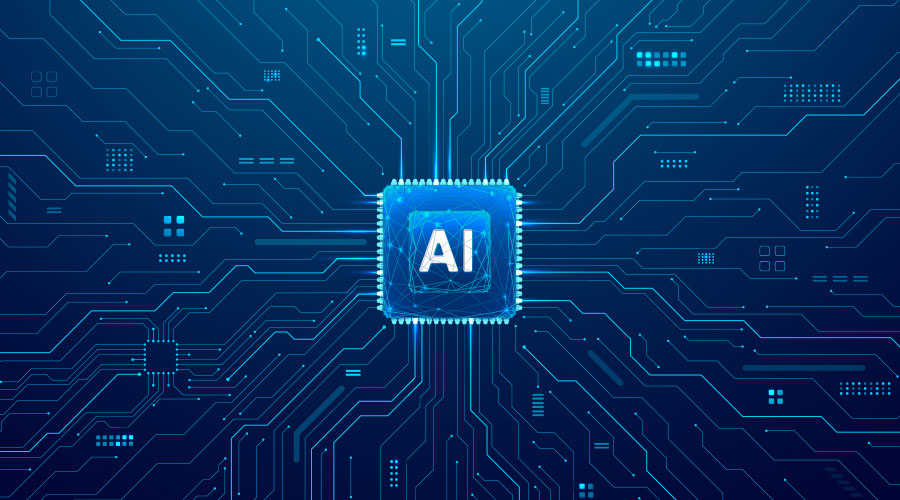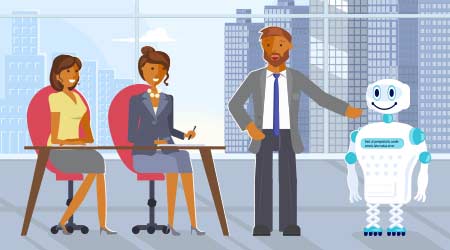« Back to Facilities Management Building Automation Category Home
Building Better Bots for Buildings
September 12, 2018
- Building Automation
By Ken Sinclair
Why are we talking about building bots and not building controls? Because the building automation industry is rapidly becoming the ears, eyes, arms, voice, and legs that are sensing, listening, seeing, and carrying out the commands of self-learning and AI thought bots. Lower the temperature, open the window shade, change the color of the light, make me happy. Our future is that all our inputs and outputs will evolve to be bots or be commanded by bots. A bot (short for "robot") is an automated program.
These bots will be the interface to our valuable cargo, "the housed humans" in our buildings. Bots cannot be rude or attention-hijacking; they are our ambassadors, and they need to be diplomatic and practice mindfulness and evolve to have empathy while providing time-well-spent digital experiences.
We are all struggling to understand better how mindfulness and time-well-spent digitized experiences will occur on our watch, but as quickly as we grasp the concepts of digital mindfulness and its overall impact we need to use that understanding for building better bots mindfully.
On our journey to people-powered buildings described in my never-ending stories, I have talked about Building Whisperers Aid Digital Transformation of Buildings and Building Emotion Connects the Physical, Virtual, and Emotional Worlds.
But we now conclude that the most important component of the open movement is opening our minds while learning to growing younger mindfully.
The business case for mindfulness is to eliminate attention-hijacking experiences from the employee. This will improve attention flow, increasing their ability to focus on their purpose as they are relieved of mundane interactions with well spend digital experiences. This Control Talk video and podcast will help you understand digital mindfulness and why it is important.
Lawrence Ampofo, PhD, is the founder of Digital Mindfulness, a global community of companies and professionals uncovering the value of creating time-well-spent digital experiences. He is at the forefront of the group of companies and thought leaders around the world that are raising awareness of the potential of humane technologies. He works with enterprises, start-ups, and developers to build time-well-spent digital experience for users, and meaningful engagement for businesses across a range of channels (mobile, IoT, social media, digital transformation). He has presented his work on social media intelligence at Oxford University, NATO, the Foreign and Commonwealth Office, as well as global marketing conferences and private events. He has given keynote speeches on behavior design, time-well-spent experiences, and digital wellness at such places as Google, Spredfast Smart Social, and The Guardian.
In the interview he says, “Soft skills are critical for a function in a well-functioning society. The Airbnb example is really useful because they were focused initially on having the whole experience be as seamless as possible for the guests and for the host but what they found was that by measures of time-well-spent from both the guest and the host, there was greater friction, so when the host and the guests were kind of moved to ask more questions or to interact with each other more on the journey then the relationship was strengthened and both parties ended up having a much better experience.” The trust factor was increased, and the platform as a whole was strengthened.
There's a concern that robots and bots will take over from us but this is so far from the truth. The arena that is developing is the "bridge between" and that's where we all have to get involved. That's why we're having these kinds of discussions. This is not a bridge that building automation folks have crossed, but we need to because we know how these technologies work. We know how we can make them invisible, but how do we make them mindful, empathetic, humanistic?
In the interview, we also ask how we measure mindfulness. The success of the bot reducing friction while creating an improved time-well-spent digital experience will be rated by the number of times the bot is used, much the way we now rate the success of apps.
Bots can do this task very well, so they will tell you of their success or failure with immediate feedback. This will be brutal as we seek acceptance of our newly created bot babies. We will need to hone our user experience — "UX" — skills quickly while educating users of the improved well-spent experience. This will be a new arena for us all, selling the advantages of our bots while understanding that one bot does not fit all.
Please join our discussion with Ampofo and others at our session, Building Emotion at AHRExpo in Atlanta. Follow this link for the times for each session and more sessions.
AutomatedBuildings.com is very pleased to introduce an amazing panel of under forty-year-olds for this first ever DIY open free education session in Atlanta. A very interesting perspective on our future by those now creating it. The session is entitled “Next Generation HVAC Controls: Open Hardware – Open Software - Open Minds.” Here’s the session description: “Truly open hardware and software is common in many industries but has only made relatively small inroads in the world of building automation where proprietary solutions still reign supreme. Open standards like BACnet enabled a revolution in open communications, but the vast majority of building automation software and hardware is still closed.”
The following thoughts speak to the softer mindful side of our bots: We've Got It Backwards: The Future Needs to Be More Human (and Less Machine). “We have succeeded beyond our wildest dreams (we’ve created machines that can now learn on their own), and we have failed beyond our worst nightmares (we’ve created “black box” artificial intelligence (AI) which we don’t — and can’t — understand).
It’s time for us to rethink the future we’re so effectively creating. I’m concerned by this trend, where we focus our mental energy into machines, rather than having them understand us more.
Smart devices and AI are increasingly taking a critical role in our lives. It’s up to us to decide whether we want a future to be more human or more machine. What makes us humans are our languages, and the cultures and thinking patterns that come with them.
Therefore, it is my wish that for this and future generations, we not just teach ourselves to code or understand machines, but rather focus on teaching ourselves how to think, and our machines to learn and understand our culture better.
This article suggests similar concerns: AI in Building Management: Here Come the Smart Buildings. The author is Karen Whitt, president of investor services and real estate management services for Colliers International in the U.S. “Facebook recently confirmed reports that bots in their AI projects have consistently drifted away from English as they talk to each other, instead creating their own unique languages on the fly. They aren’t rewarded for sticking to human language, so they gravitate towards the most efficient means of communication, which is usually a symbolic expression to describe complex concepts.”
I have been talking about voice as a game changer, but the focus now moves to self-learning machine vision as the newest cost-effective edge bot capability. Check out this article: Building Better Bots with Machine Vision. "’Your Building Control is watching you’ ... mindfully. Creating tomorrow today with open software, open hardware, and open minds” — Calvin Slater.
Some random thoughts:
To opt in or opt out? That is the question... Do you opt in when entering a building and get all the services and what happens when you opt out? If the building is empathic when I opt in how will the building behave? Will the building become apathetic and indifferent? This same question applies when I enter a smart city? Will I still be able to have the same UX or will I lose out? Will I have to read and agree to terms and agreements for every space I enter?
Our phones can be seen as our tech PA that could render me visible or completely invisible. My tech PA holds my tech passport and communicates with the edge bots so they know my preferences and I don't have to worry about how my data is used. Similar to an RFID blocking wallet my cards can only be read once I pull them out to pay.
The idea of physical objects having emotions is a bit deceiving and might be misunderstood by the general public. When talking about the emotional intelligence of a building we can think about different levels (emotional scale): 0 = the building is apathetic, 10 = the building has a full understanding of our needs and functions as a host to serve and accommodate us in everything we might need. Can the Turing test be used to score the buildings emotional intelligence? (The Turing test, developed by Alan Turing, aims to determine a machine's ability to exhibit intelligent behavior equal to, or indistinguishable from, that of a human.
Ken Sinclair is the founder, owner, and publisher of an online resource called AutomatedBuildings.com. He writes a monthly column for FacilitiesNet.com about what is new in the Internet of Things (IOT) for building automation.








